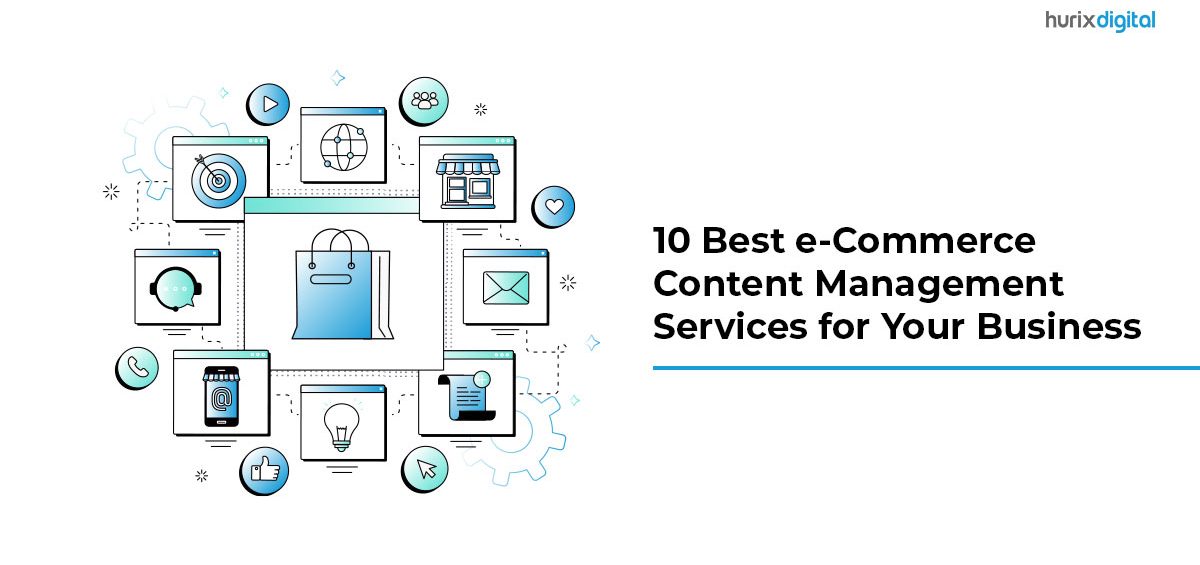Summary
This article is about the best eCommerce content management services for your business. In this article, we will discuss the importance of investing in smart and innovative content management services to create an effective online store.
With the rapid advancement and adoption of digital technologies, the eCommerce business is growing at an unprecedented rate. Everything we need is available online, and all it takes is a few clicks to get it delivered to our house.
By 2026, approximately 24% of retail purchases will happen online. If you are a business owner, it is high time you become part of this booming market. You must invest in smart and innovative eCommerce content management services to make the best of the opportunity and create an effective online store.
Table of Contents
- What are eCommerce Content Management Services?
- What are the Top 10 Content Management Services for eCommerce
- Comparative Table
- Closing Thoughts
What are eCommerce Content Management Services?
Content management services or CMS allows businesses and organizations to create, edit, and publish online content. CMS for eCommerce refers to a wide range of digital tools, editing strategies, etc., to manage eCommerce websites. In today’s digitally paced world, businesses must create an online presence and adopt eCommerce solutions.
Some important elements and functionalities offered by eCommerce content management services are:
- SEO optimization
- Content personalization
- Content performance analytics
- Product catalog management
- Content publishing schedule and management
- Content marketing and advertising
- Multichannel content management
Also Read: How Can Content Authoring Tools Help You in Your Business Growth?
What are the Top 10 Content Management Services for eCommerce
As an eCommerce business owner, you must make a smart and strategic decision while choosing an eCommerce content management service. The CMS platform must align with the objectives and requirements of your business. Before choosing a platform, properly evaluate your business and the content creation you need. A few key indicators of a good CMS platform are:
- User-friendliness
- Scalability and flexibility
- Quality editing tools
- SEO capabilities
- Multichannel capabilities
- Analytics and Reporting
- Integration capabilities
- Customer support
- Mobile friendly features
1. Shopify
If you are looking for an extremely user-friendly eCommerce CMS platform with reliable functionalities, Shopify is an appropriate choice. It is an all-in-one eCommerce store suitable for various industries like fashion & apparel, pet store, electronics, books & stationary, and many more.
The platform comes with numerous pre-made templates saving you from the effort of designing your online store from scratch. Additionally, the Shopify app allows you to manage your online store from anywhere and anytime.
2. WooCommerce
If you have some experience with WordPress, you won’t face any difficulties with WooCommerce. With this highly intuitive platform, you can transition your WordPress platform into a fully functional online store.
Its numerous features and functionalities, including a modern user interface, third-party integrations, unlimited customizations, etc., will start your eCommerce store in less than a day. However, it is important to remember that this CMS platform only works with WordPress themes.
3. Magneto
Magneto is a great option if you have the right technical expertise and the capacity to make a slightly heavy CMS investment. If yes, you can benefit significantly from its powerful features and SEO friendliness.
Its advanced reporting and analytical features allow you to serve your customers effectively and innovatively. Another highlight of Magneto is the big community with more than 360,000 members. You can clear all your doubts anytime and share your thoughts with this vast community.
4. BigCommerce
BigCommerce is highly appreciated for its eCommerce content marketing capabilities, which can lead to rapid business growth and positive customer experience. The user-friendly and robust interface can cater to businesses of all sizes and types.
Some of its popular customers who have showcased great trust in the platform are Toyota, Ben & Jerry’s, Skull Candy, etc. Consequently, BigCommerce offers expensive monthly plans, which can be less affordable for small and new businesses.
5. WordPress
WordPress, along with helping businesses set up online stores, is also an ideal choice for those who want to create websites inclusive of blogs and portfolios. WordPress eCommerce platform integration capabilities are advanced, which can be further enhanced through its numerous plugins and add-ons.
The intuitive centralized dashboard and SEO functionalities make WordPress an ideal choice for small and mid-sized business owners. However, WordPress security features are not regularly updated compared to other CMS platforms. You might be required to use third-party security plugins to protect your eCommerce platform effectively.
Also Read: How to Craft Compelling Content Using eContent Design and Development
6. PrestaShop
If you are a small or mid-sized business, then PrestaShop can be an ideal choice. One major highlight of PrestaShop is the feature that allows customers to upload pictures to buy & sell customized products.
The catalog page is extremely easy to make, which can be further enhanced by creating numerous categories and sub-categories. If you are seeking an easy installation and set-up process, PrestaShop’s user-friendly interface won’t disappoint you.
7. OpenCart
OpenCart is a free CMS platform with numerous advantageous features like multiple payment options, delivery & shipping methods, multi-lingual capabilities, and much more. It also has a very vast and diverse community with more than 110,000 registered members.
Apart from the customer care services offered by the platform, you can also reach out to this community with queries related to registration, payment, configuration, etc.
8. Drupal
Drupal is one of the few open-source CMS platforms which separates front-end and back-end online stores allowing you to create and publish your content with much more ease and comfort. It is free to use with notable flexibility and customization options.
However, you will require extensive technical knowledge to run the platform efficiently. Drupal’s eCommerce content migration capabilities have also been rated poorly.
9. Wix
What made Wix highly popular in the CRM industry is its beginner-friendly features. A beginner can get started in minutes with Wix’s flexible features and pre-made templates. However, when installing plugins for extending the functionalities, Wix can be a little disappointing.
Nevertheless, Wix boasts several advantages. The strategically curated inventory management systems make up for the drawbacks. Key features like inventory alerts, product catalogs, order integration, multichannel selling, etc., will greatly optimize all your eCommerce operations.
10. HubSpot
HubSpot is often described as a very comprehensive eCommerce solution, and rightly so. Some of its high-performing features are pipeline management, contact management, revenue management, self-service resources, and many more.
It is affordably priced and an appropriate choice for businesses of all sizes. HubSpot’s customer service team is available 24/7 and offers a wide resource base enabling self-service. If you focus on workflow and content management, then HubSpot is a suitable choice.
Comparative Table
| CRM Platform | User-Friendliness | SEO | Integration | Customer Support | Scalability |
| Shopify | Excellent | Good | Excellent | Excellent | Excellent |
| Magneto | Average | Excellent | Good | Average | Good |
| WooCommerce | Good | Average | Good | Good | Good |
| BigCommerce | Average | Good | Good | Excellent | Excellent |
| WordPress | Excellent | Good | Good | Average | Good |
| PrestaShop | Average | Average | Good | Average | Average |
| OpenCart | Average | Poor | Average | Average | Average |
| Drupal | Poor | Average | Good | Average | Excellent |
| Wix | Average | Good | Average | Good | Average |
| HubSpot | Excellent | Good | Excellent | Excellent | Good |
Closing Thoughts
It might initially seem like a heavy investment if you haven’t utilized eCommerce content management services yet. However, to achieve success and expand your business in today’s world, eCommerce solutions are a necessity. They can optimize all your eCommerce workflows, build your online presence, and enhance the customer experience.
Determining the ideal eCommerce content management service is another challenge. Reach out to us at Hurix Digital to clear any doubts. We are known for our high-quality, reliable digital content solutions.
Contact our experts now and get started. Hope to see you soon!







